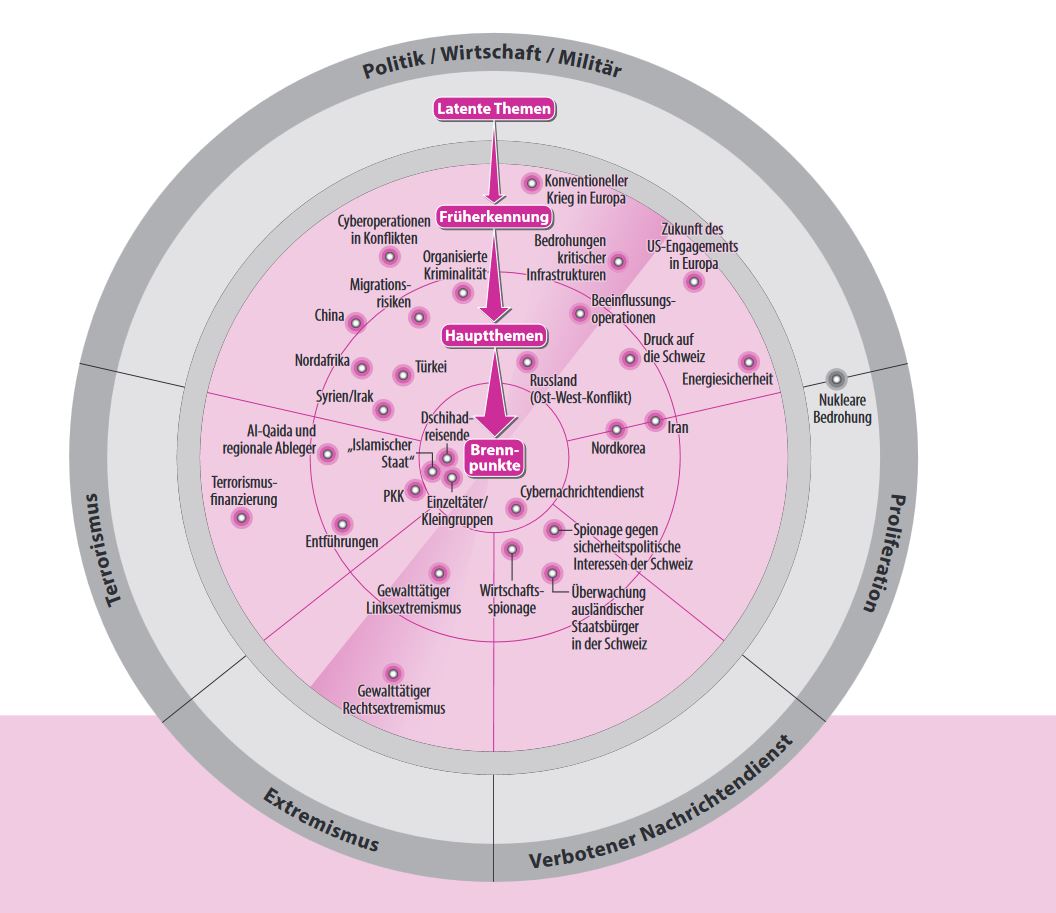Situation report of the intelligence service
In a strategic environment where the terrorist threat is heightened and cyber risks and espionage activities are on the rise, the annual situation report of the Federal Intelligence Service (FIS) is the critical tool for guiding security policy, the federal agency writes.

In this year's edition of its Management Report the FIS has decided to focus on Russia, whose relations with the transatlantic West are steadily deteriorating. A development that worries Swiss security policy, as the FIS writes and continues: "In this context, information operations are gaining in importance. Combating prohibited intelligence is still topical, whether it uses conventional means or takes the form of cyber espionage. The pressure to obtain information worthy of protection remains. Espionage is still used by some states as a tool to obtain information. Prohibited intelligence is also conducted in Switzerland - not only against Switzerland, but also against international organizations or non-governmental organizations (NGOs) based in Switzerland. Sabotage activities in cyber space are attracting more and more global attention. States that have their own offensive cyber capabilities are pushing their further development intensively."
90 persons at risk registered
The assessment of the terrorist threat in Switzerland remains elevated in view of the attacks that have taken place in Europe in recent months. The modus operandi of these attacks confirms the predictions of the FIS: they are mostly isolated lone perpetrators or smaller groups that have become radicalized without traveling to a conflict zone.
In April 2018, the FIS registered around 90 persons at risk. The term "high-risk person" refers to individuals who today pose an increased risk to Switzerland's security. Unlike jihadist travelers, these risk persons did not come from cumulative statistics, but would provide as complete a picture as possible of persons who posed a serious terrorist threat to Switzerland's internal and external security. Among the approximately 90 high-risk persons registered by the FIS are also those who have radicalized themselves in this country but have not traveled to a conflict zone.
As part of terrorism prevention, the FIS is monitoring relevant public websites, social media and forums used by jihadists. According to the statement, since 2012 the FIS has identified around 585 users (550 at the end of 2017) who spread jihadist ideas on the internet in or from Switzerland or networked with like-minded people in Switzerland and abroad. If there are indications that a person has become radicalized, the FIS applies for measures under immigration law, such as entry bans, expulsions, revocation of residence status and alerts for residence investigations. If criminal acts are suspected, the case goes to the prosecution authorities.
The number of jihadist-motivated travelers from Switzerland who have been or are still in conflict zones has stabilized at 93 cases. Of the jihadist travelers recorded from 2001 to the present, 79 went to Syria and Iraq and 14 to Somalia, Afghanistan and Pakistan, according to the data. Some of these individuals are still on the ground, 32 have died (of which 26 are confirmed), and others are traveling around the conflict zones or have returned to Switzerland, it said. The number of returnees was 16 (of which 13 were confirmed).
Procurement measures subject to approval
In the area of terrorism, counterintelligence, critical infrastructure protection or proliferation, the FIS has been able to actively use procurement measures subject to approval since September 1, 2017, which are subject to the strict provisions of the Intelligence Services Act. By the end of December 2017, the FIS had launched four operations with a total of 40 such measures, following approval by the Federal Administrative Court (FAC) and the relevant political authorities. Two operations took place in the context of counterterrorism and two others in the context of counterintelligence. The procurement measures were applied specifically to the most serious threats, as provided for by law.
Source: VBS









